BM-5301-I: Airbnb's Strategic Information Systems Management Report
VerifiedAdded on 2021/04/24
|7
|1926
|31
Report
AI Summary
This report provides a detailed analysis of Airbnb's business model, focusing on its digital transformation and strategic information systems management. It examines how Airbnb has disrupted the hotel industry by acting as a transaction facilitator between hosts and travelers, leveraging technology to provide a seamless customer experience. The report explores Airbnb's revenue model, its ability to outperform traditional hotels through minimum regulations, and its focus on customer-centricity. It also discusses the impact of various technologies and services on Airbnb's growth, highlighting its role in the sharing economy and its ability to address customer needs. The analysis includes discussions on Airbnb's pricing structure, its use of data to improve customer experience, and the importance of building trust within its community. Furthermore, the report delves into the concept of a two-sided market, examining how Airbnb utilizes this model to connect different user groups and create value. The report concludes by highlighting Airbnb's innovative approach to hospitality and its ability to adapt to changing market demands.
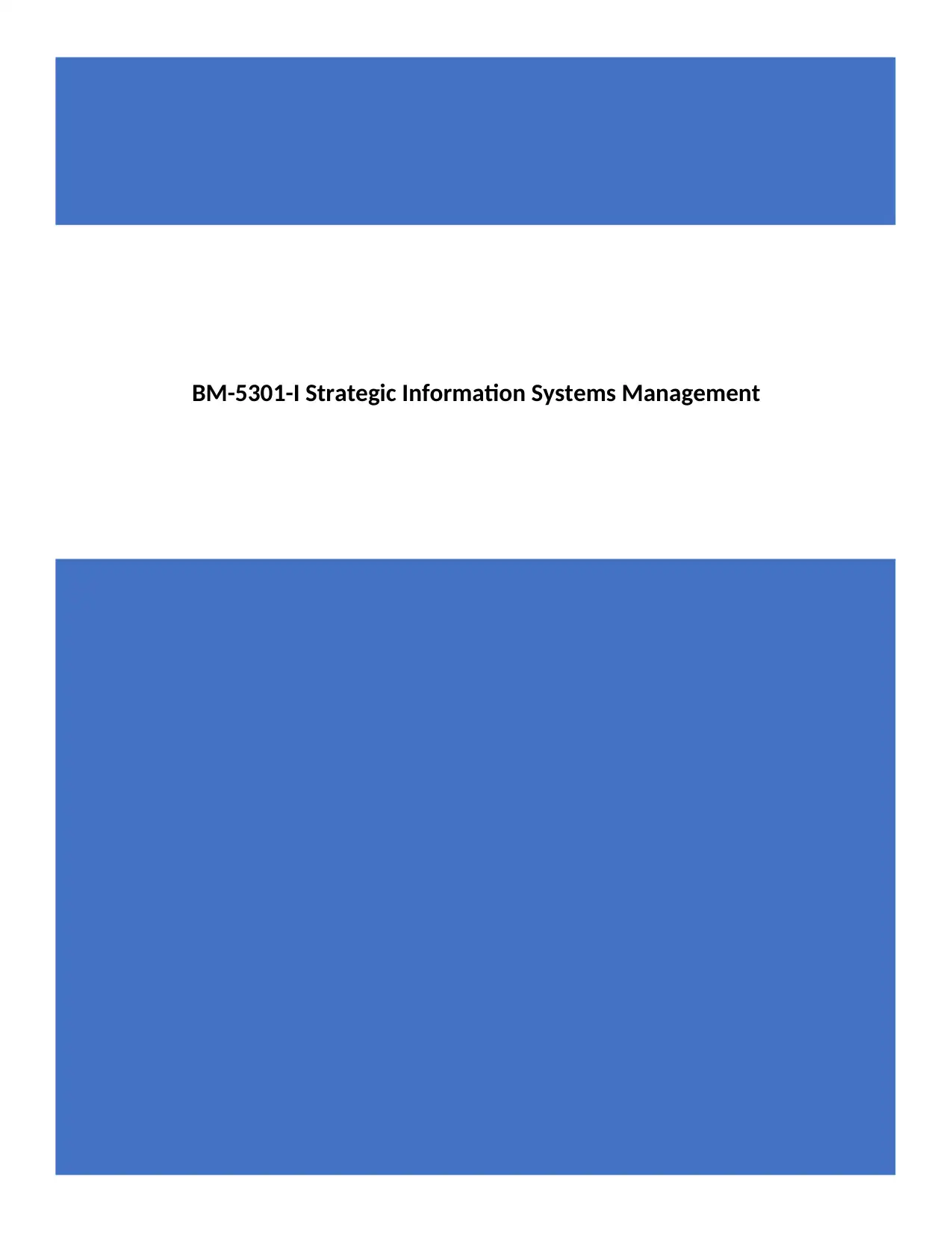
BM-5301-I Strategic Information Systems Management
Paraphrase This Document
Need a fresh take? Get an instant paraphrase of this document with our AI Paraphraser
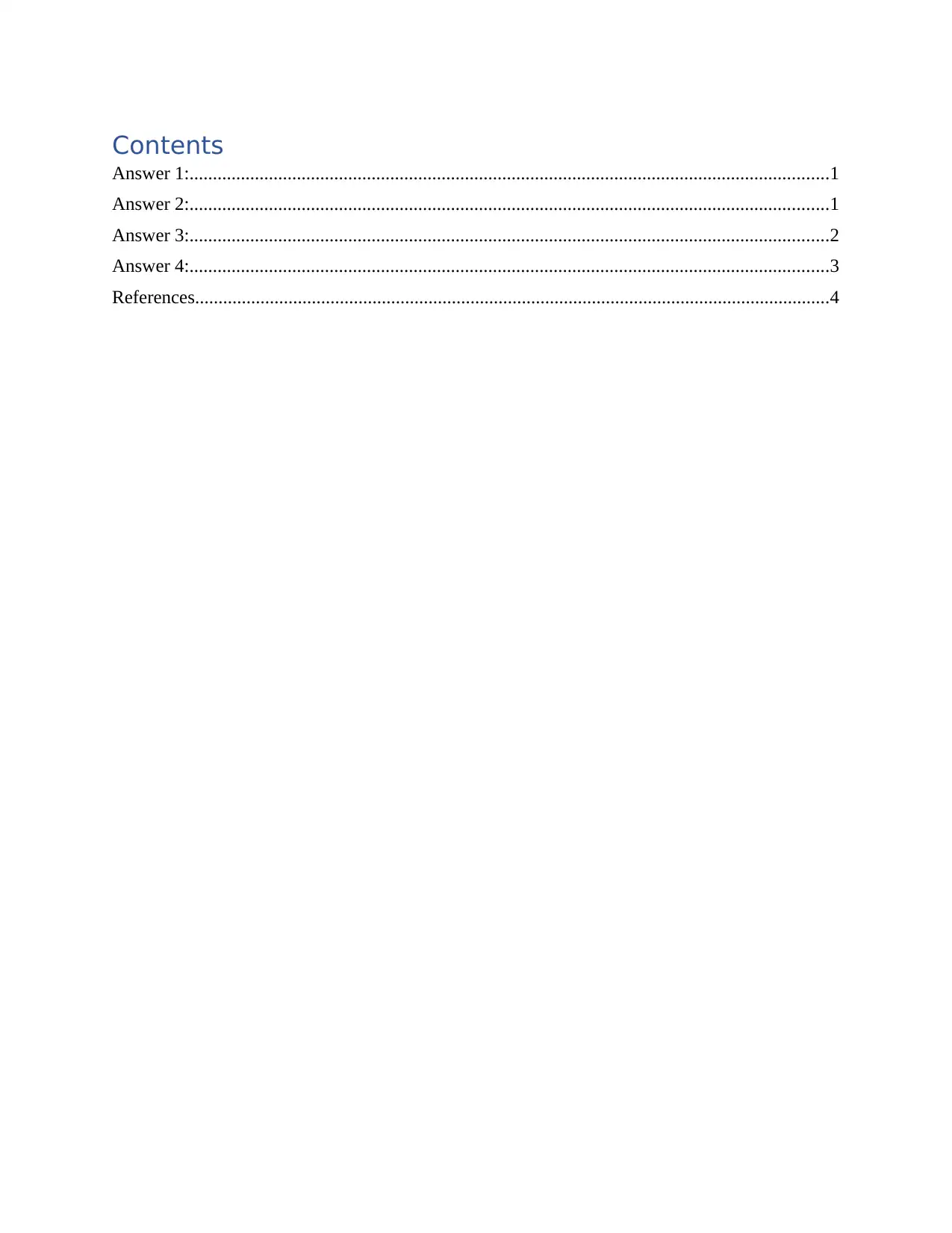
Contents
Answer 1:.........................................................................................................................................1
Answer 2:.........................................................................................................................................1
Answer 3:.........................................................................................................................................2
Answer 4:.........................................................................................................................................3
References........................................................................................................................................4
Answer 1:.........................................................................................................................................1
Answer 2:.........................................................................................................................................1
Answer 3:.........................................................................................................................................2
Answer 4:.........................................................................................................................................3
References........................................................................................................................................4
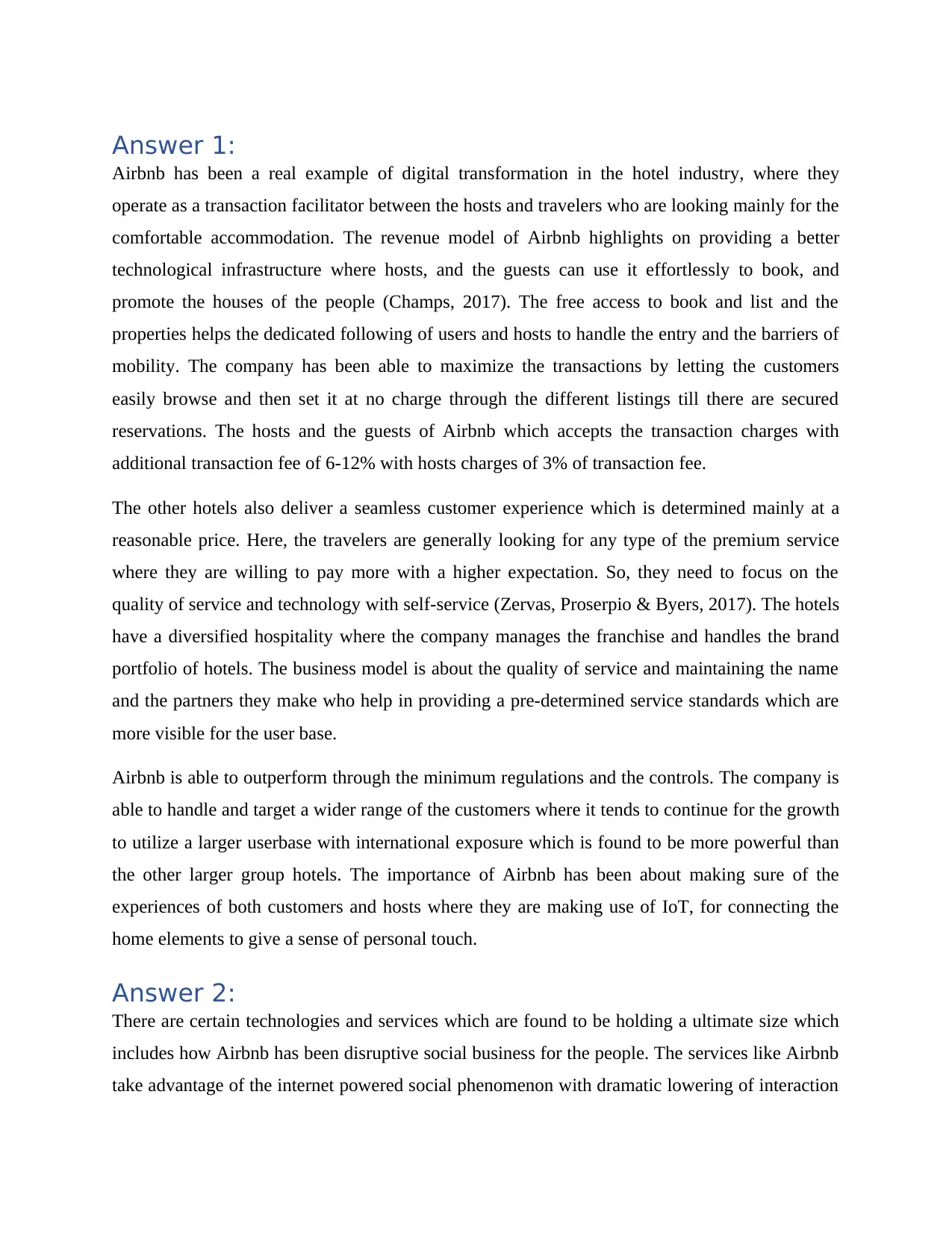
Answer 1:
Airbnb has been a real example of digital transformation in the hotel industry, where they
operate as a transaction facilitator between the hosts and travelers who are looking mainly for the
comfortable accommodation. The revenue model of Airbnb highlights on providing a better
technological infrastructure where hosts, and the guests can use it effortlessly to book, and
promote the houses of the people (Champs, 2017). The free access to book and list and the
properties helps the dedicated following of users and hosts to handle the entry and the barriers of
mobility. The company has been able to maximize the transactions by letting the customers
easily browse and then set it at no charge through the different listings till there are secured
reservations. The hosts and the guests of Airbnb which accepts the transaction charges with
additional transaction fee of 6-12% with hosts charges of 3% of transaction fee.
The other hotels also deliver a seamless customer experience which is determined mainly at a
reasonable price. Here, the travelers are generally looking for any type of the premium service
where they are willing to pay more with a higher expectation. So, they need to focus on the
quality of service and technology with self-service (Zervas, Proserpio & Byers, 2017). The hotels
have a diversified hospitality where the company manages the franchise and handles the brand
portfolio of hotels. The business model is about the quality of service and maintaining the name
and the partners they make who help in providing a pre-determined service standards which are
more visible for the user base.
Airbnb is able to outperform through the minimum regulations and the controls. The company is
able to handle and target a wider range of the customers where it tends to continue for the growth
to utilize a larger userbase with international exposure which is found to be more powerful than
the other larger group hotels. The importance of Airbnb has been about making sure of the
experiences of both customers and hosts where they are making use of IoT, for connecting the
home elements to give a sense of personal touch.
Answer 2:
There are certain technologies and services which are found to be holding a ultimate size which
includes how Airbnb has been disruptive social business for the people. The services like Airbnb
take advantage of the internet powered social phenomenon with dramatic lowering of interaction
Airbnb has been a real example of digital transformation in the hotel industry, where they
operate as a transaction facilitator between the hosts and travelers who are looking mainly for the
comfortable accommodation. The revenue model of Airbnb highlights on providing a better
technological infrastructure where hosts, and the guests can use it effortlessly to book, and
promote the houses of the people (Champs, 2017). The free access to book and list and the
properties helps the dedicated following of users and hosts to handle the entry and the barriers of
mobility. The company has been able to maximize the transactions by letting the customers
easily browse and then set it at no charge through the different listings till there are secured
reservations. The hosts and the guests of Airbnb which accepts the transaction charges with
additional transaction fee of 6-12% with hosts charges of 3% of transaction fee.
The other hotels also deliver a seamless customer experience which is determined mainly at a
reasonable price. Here, the travelers are generally looking for any type of the premium service
where they are willing to pay more with a higher expectation. So, they need to focus on the
quality of service and technology with self-service (Zervas, Proserpio & Byers, 2017). The hotels
have a diversified hospitality where the company manages the franchise and handles the brand
portfolio of hotels. The business model is about the quality of service and maintaining the name
and the partners they make who help in providing a pre-determined service standards which are
more visible for the user base.
Airbnb is able to outperform through the minimum regulations and the controls. The company is
able to handle and target a wider range of the customers where it tends to continue for the growth
to utilize a larger userbase with international exposure which is found to be more powerful than
the other larger group hotels. The importance of Airbnb has been about making sure of the
experiences of both customers and hosts where they are making use of IoT, for connecting the
home elements to give a sense of personal touch.
Answer 2:
There are certain technologies and services which are found to be holding a ultimate size which
includes how Airbnb has been disruptive social business for the people. The services like Airbnb
take advantage of the internet powered social phenomenon with dramatic lowering of interaction
⊘ This is a preview!⊘
Do you want full access?
Subscribe today to unlock all pages.

Trusted by 1+ million students worldwide
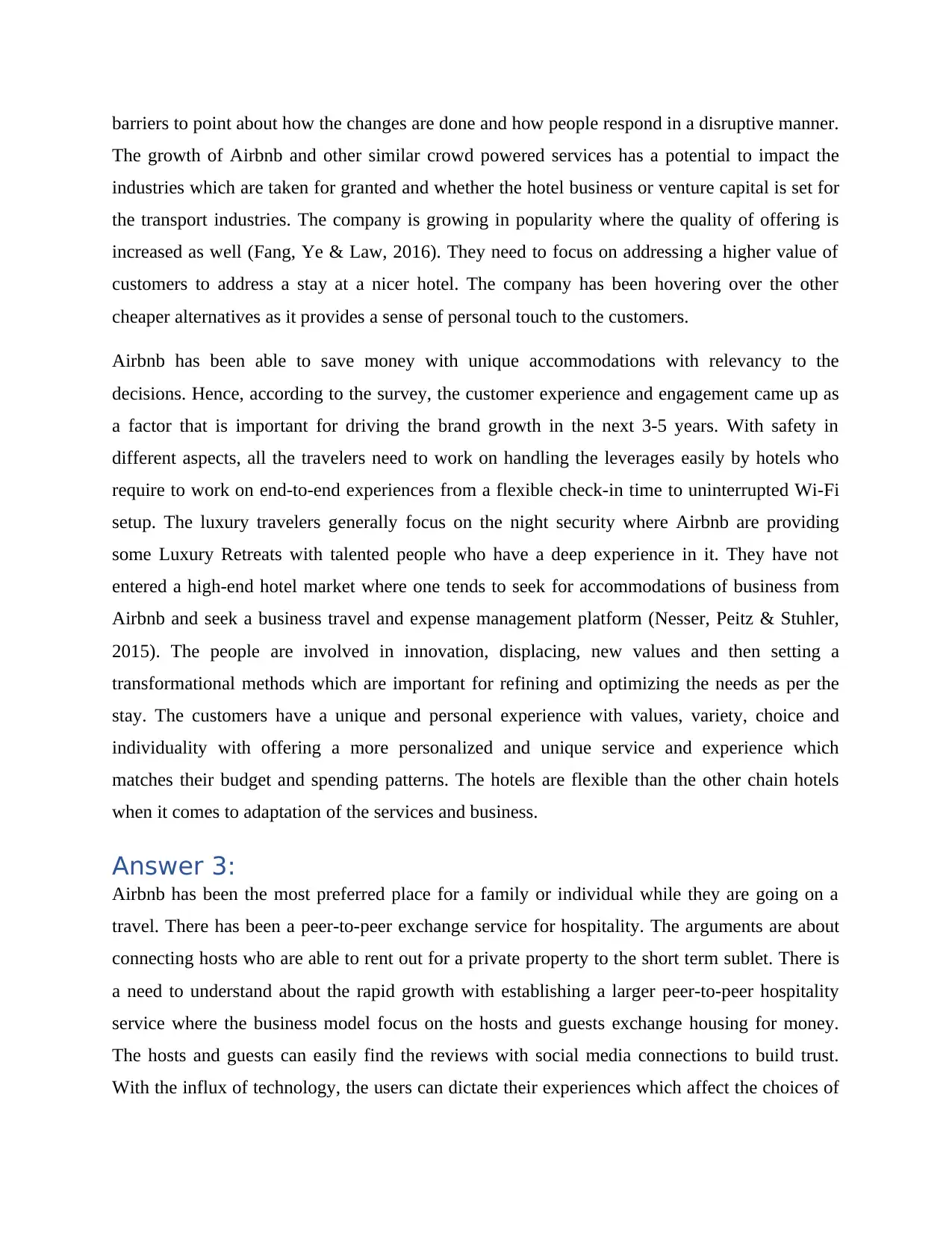
barriers to point about how the changes are done and how people respond in a disruptive manner.
The growth of Airbnb and other similar crowd powered services has a potential to impact the
industries which are taken for granted and whether the hotel business or venture capital is set for
the transport industries. The company is growing in popularity where the quality of offering is
increased as well (Fang, Ye & Law, 2016). They need to focus on addressing a higher value of
customers to address a stay at a nicer hotel. The company has been hovering over the other
cheaper alternatives as it provides a sense of personal touch to the customers.
Airbnb has been able to save money with unique accommodations with relevancy to the
decisions. Hence, according to the survey, the customer experience and engagement came up as
a factor that is important for driving the brand growth in the next 3-5 years. With safety in
different aspects, all the travelers need to work on handling the leverages easily by hotels who
require to work on end-to-end experiences from a flexible check-in time to uninterrupted Wi-Fi
setup. The luxury travelers generally focus on the night security where Airbnb are providing
some Luxury Retreats with talented people who have a deep experience in it. They have not
entered a high-end hotel market where one tends to seek for accommodations of business from
Airbnb and seek a business travel and expense management platform (Nesser, Peitz & Stuhler,
2015). The people are involved in innovation, displacing, new values and then setting a
transformational methods which are important for refining and optimizing the needs as per the
stay. The customers have a unique and personal experience with values, variety, choice and
individuality with offering a more personalized and unique service and experience which
matches their budget and spending patterns. The hotels are flexible than the other chain hotels
when it comes to adaptation of the services and business.
Answer 3:
Airbnb has been the most preferred place for a family or individual while they are going on a
travel. There has been a peer-to-peer exchange service for hospitality. The arguments are about
connecting hosts who are able to rent out for a private property to the short term sublet. There is
a need to understand about the rapid growth with establishing a larger peer-to-peer hospitality
service where the business model focus on the hosts and guests exchange housing for money.
The hosts and guests can easily find the reviews with social media connections to build trust.
With the influx of technology, the users can dictate their experiences which affect the choices of
The growth of Airbnb and other similar crowd powered services has a potential to impact the
industries which are taken for granted and whether the hotel business or venture capital is set for
the transport industries. The company is growing in popularity where the quality of offering is
increased as well (Fang, Ye & Law, 2016). They need to focus on addressing a higher value of
customers to address a stay at a nicer hotel. The company has been hovering over the other
cheaper alternatives as it provides a sense of personal touch to the customers.
Airbnb has been able to save money with unique accommodations with relevancy to the
decisions. Hence, according to the survey, the customer experience and engagement came up as
a factor that is important for driving the brand growth in the next 3-5 years. With safety in
different aspects, all the travelers need to work on handling the leverages easily by hotels who
require to work on end-to-end experiences from a flexible check-in time to uninterrupted Wi-Fi
setup. The luxury travelers generally focus on the night security where Airbnb are providing
some Luxury Retreats with talented people who have a deep experience in it. They have not
entered a high-end hotel market where one tends to seek for accommodations of business from
Airbnb and seek a business travel and expense management platform (Nesser, Peitz & Stuhler,
2015). The people are involved in innovation, displacing, new values and then setting a
transformational methods which are important for refining and optimizing the needs as per the
stay. The customers have a unique and personal experience with values, variety, choice and
individuality with offering a more personalized and unique service and experience which
matches their budget and spending patterns. The hotels are flexible than the other chain hotels
when it comes to adaptation of the services and business.
Answer 3:
Airbnb has been the most preferred place for a family or individual while they are going on a
travel. There has been a peer-to-peer exchange service for hospitality. The arguments are about
connecting hosts who are able to rent out for a private property to the short term sublet. There is
a need to understand about the rapid growth with establishing a larger peer-to-peer hospitality
service where the business model focus on the hosts and guests exchange housing for money.
The hosts and guests can easily find the reviews with social media connections to build trust.
With the influx of technology, the users can dictate their experiences which affect the choices of
Paraphrase This Document
Need a fresh take? Get an instant paraphrase of this document with our AI Paraphraser
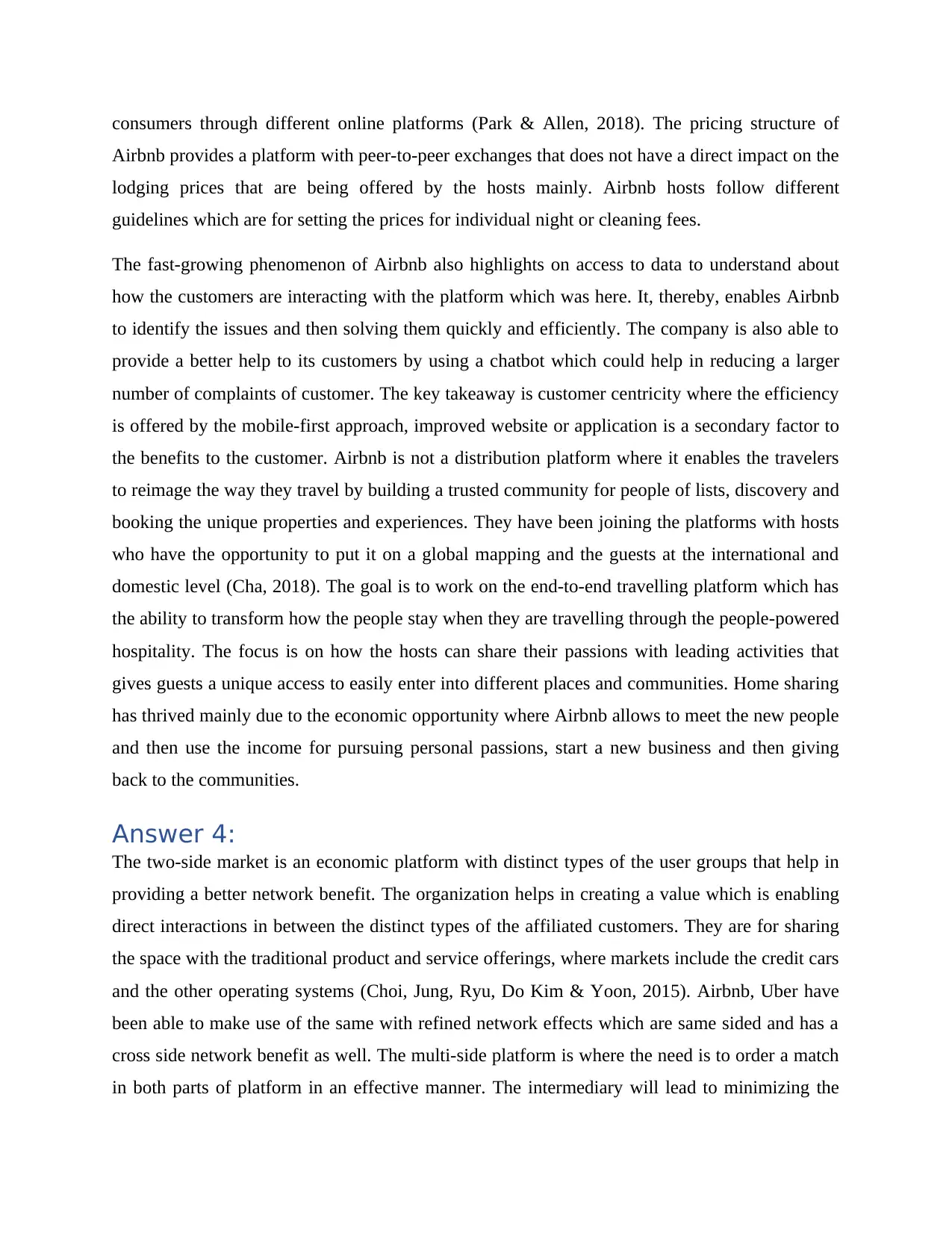
consumers through different online platforms (Park & Allen, 2018). The pricing structure of
Airbnb provides a platform with peer-to-peer exchanges that does not have a direct impact on the
lodging prices that are being offered by the hosts mainly. Airbnb hosts follow different
guidelines which are for setting the prices for individual night or cleaning fees.
The fast-growing phenomenon of Airbnb also highlights on access to data to understand about
how the customers are interacting with the platform which was here. It, thereby, enables Airbnb
to identify the issues and then solving them quickly and efficiently. The company is also able to
provide a better help to its customers by using a chatbot which could help in reducing a larger
number of complaints of customer. The key takeaway is customer centricity where the efficiency
is offered by the mobile-first approach, improved website or application is a secondary factor to
the benefits to the customer. Airbnb is not a distribution platform where it enables the travelers
to reimage the way they travel by building a trusted community for people of lists, discovery and
booking the unique properties and experiences. They have been joining the platforms with hosts
who have the opportunity to put it on a global mapping and the guests at the international and
domestic level (Cha, 2018). The goal is to work on the end-to-end travelling platform which has
the ability to transform how the people stay when they are travelling through the people-powered
hospitality. The focus is on how the hosts can share their passions with leading activities that
gives guests a unique access to easily enter into different places and communities. Home sharing
has thrived mainly due to the economic opportunity where Airbnb allows to meet the new people
and then use the income for pursuing personal passions, start a new business and then giving
back to the communities.
Answer 4:
The two-side market is an economic platform with distinct types of the user groups that help in
providing a better network benefit. The organization helps in creating a value which is enabling
direct interactions in between the distinct types of the affiliated customers. They are for sharing
the space with the traditional product and service offerings, where markets include the credit cars
and the other operating systems (Choi, Jung, Ryu, Do Kim & Yoon, 2015). Airbnb, Uber have
been able to make use of the same with refined network effects which are same sided and has a
cross side network benefit as well. The multi-side platform is where the need is to order a match
in both parts of platform in an effective manner. The intermediary will lead to minimizing the
Airbnb provides a platform with peer-to-peer exchanges that does not have a direct impact on the
lodging prices that are being offered by the hosts mainly. Airbnb hosts follow different
guidelines which are for setting the prices for individual night or cleaning fees.
The fast-growing phenomenon of Airbnb also highlights on access to data to understand about
how the customers are interacting with the platform which was here. It, thereby, enables Airbnb
to identify the issues and then solving them quickly and efficiently. The company is also able to
provide a better help to its customers by using a chatbot which could help in reducing a larger
number of complaints of customer. The key takeaway is customer centricity where the efficiency
is offered by the mobile-first approach, improved website or application is a secondary factor to
the benefits to the customer. Airbnb is not a distribution platform where it enables the travelers
to reimage the way they travel by building a trusted community for people of lists, discovery and
booking the unique properties and experiences. They have been joining the platforms with hosts
who have the opportunity to put it on a global mapping and the guests at the international and
domestic level (Cha, 2018). The goal is to work on the end-to-end travelling platform which has
the ability to transform how the people stay when they are travelling through the people-powered
hospitality. The focus is on how the hosts can share their passions with leading activities that
gives guests a unique access to easily enter into different places and communities. Home sharing
has thrived mainly due to the economic opportunity where Airbnb allows to meet the new people
and then use the income for pursuing personal passions, start a new business and then giving
back to the communities.
Answer 4:
The two-side market is an economic platform with distinct types of the user groups that help in
providing a better network benefit. The organization helps in creating a value which is enabling
direct interactions in between the distinct types of the affiliated customers. They are for sharing
the space with the traditional product and service offerings, where markets include the credit cars
and the other operating systems (Choi, Jung, Ryu, Do Kim & Yoon, 2015). Airbnb, Uber have
been able to make use of the same with refined network effects which are same sided and has a
cross side network benefit as well. The multi-side platform is where the need is to order a match
in both parts of platform in an effective manner. The intermediary will lead to minimizing the
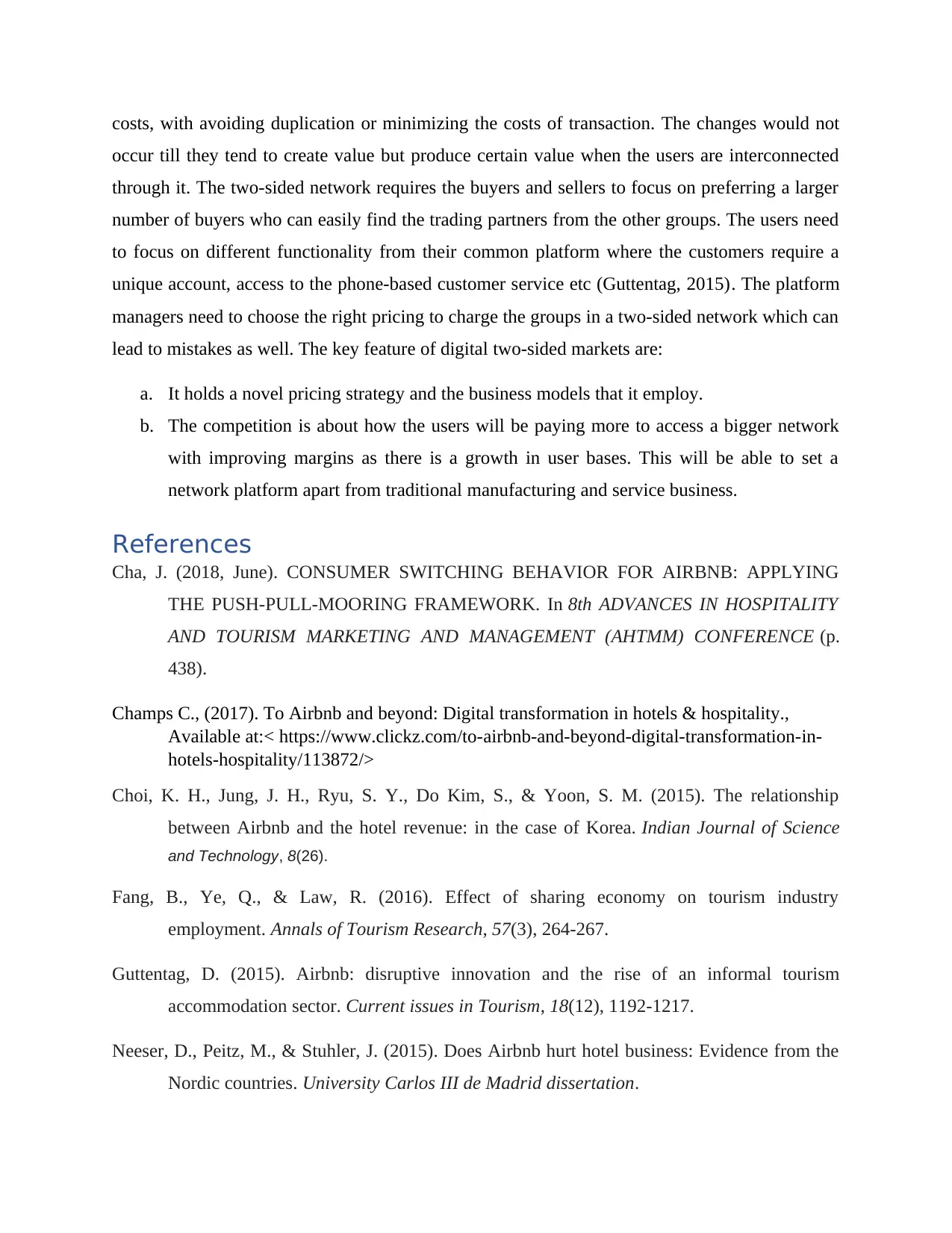
costs, with avoiding duplication or minimizing the costs of transaction. The changes would not
occur till they tend to create value but produce certain value when the users are interconnected
through it. The two-sided network requires the buyers and sellers to focus on preferring a larger
number of buyers who can easily find the trading partners from the other groups. The users need
to focus on different functionality from their common platform where the customers require a
unique account, access to the phone-based customer service etc (Guttentag, 2015). The platform
managers need to choose the right pricing to charge the groups in a two-sided network which can
lead to mistakes as well. The key feature of digital two-sided markets are:
a. It holds a novel pricing strategy and the business models that it employ.
b. The competition is about how the users will be paying more to access a bigger network
with improving margins as there is a growth in user bases. This will be able to set a
network platform apart from traditional manufacturing and service business.
References
Cha, J. (2018, June). CONSUMER SWITCHING BEHAVIOR FOR AIRBNB: APPLYING
THE PUSH-PULL-MOORING FRAMEWORK. In 8th ADVANCES IN HOSPITALITY
AND TOURISM MARKETING AND MANAGEMENT (AHTMM) CONFERENCE (p.
438).
Champs C., (2017). To Airbnb and beyond: Digital transformation in hotels & hospitality.,
Available at:< https://www.clickz.com/to-airbnb-and-beyond-digital-transformation-in-
hotels-hospitality/113872/>
Choi, K. H., Jung, J. H., Ryu, S. Y., Do Kim, S., & Yoon, S. M. (2015). The relationship
between Airbnb and the hotel revenue: in the case of Korea. Indian Journal of Science
and Technology, 8(26).
Fang, B., Ye, Q., & Law, R. (2016). Effect of sharing economy on tourism industry
employment. Annals of Tourism Research, 57(3), 264-267.
Guttentag, D. (2015). Airbnb: disruptive innovation and the rise of an informal tourism
accommodation sector. Current issues in Tourism, 18(12), 1192-1217.
Neeser, D., Peitz, M., & Stuhler, J. (2015). Does Airbnb hurt hotel business: Evidence from the
Nordic countries. University Carlos III de Madrid dissertation.
occur till they tend to create value but produce certain value when the users are interconnected
through it. The two-sided network requires the buyers and sellers to focus on preferring a larger
number of buyers who can easily find the trading partners from the other groups. The users need
to focus on different functionality from their common platform where the customers require a
unique account, access to the phone-based customer service etc (Guttentag, 2015). The platform
managers need to choose the right pricing to charge the groups in a two-sided network which can
lead to mistakes as well. The key feature of digital two-sided markets are:
a. It holds a novel pricing strategy and the business models that it employ.
b. The competition is about how the users will be paying more to access a bigger network
with improving margins as there is a growth in user bases. This will be able to set a
network platform apart from traditional manufacturing and service business.
References
Cha, J. (2018, June). CONSUMER SWITCHING BEHAVIOR FOR AIRBNB: APPLYING
THE PUSH-PULL-MOORING FRAMEWORK. In 8th ADVANCES IN HOSPITALITY
AND TOURISM MARKETING AND MANAGEMENT (AHTMM) CONFERENCE (p.
438).
Champs C., (2017). To Airbnb and beyond: Digital transformation in hotels & hospitality.,
Available at:< https://www.clickz.com/to-airbnb-and-beyond-digital-transformation-in-
hotels-hospitality/113872/>
Choi, K. H., Jung, J. H., Ryu, S. Y., Do Kim, S., & Yoon, S. M. (2015). The relationship
between Airbnb and the hotel revenue: in the case of Korea. Indian Journal of Science
and Technology, 8(26).
Fang, B., Ye, Q., & Law, R. (2016). Effect of sharing economy on tourism industry
employment. Annals of Tourism Research, 57(3), 264-267.
Guttentag, D. (2015). Airbnb: disruptive innovation and the rise of an informal tourism
accommodation sector. Current issues in Tourism, 18(12), 1192-1217.
Neeser, D., Peitz, M., & Stuhler, J. (2015). Does Airbnb hurt hotel business: Evidence from the
Nordic countries. University Carlos III de Madrid dissertation.
⊘ This is a preview!⊘
Do you want full access?
Subscribe today to unlock all pages.

Trusted by 1+ million students worldwide
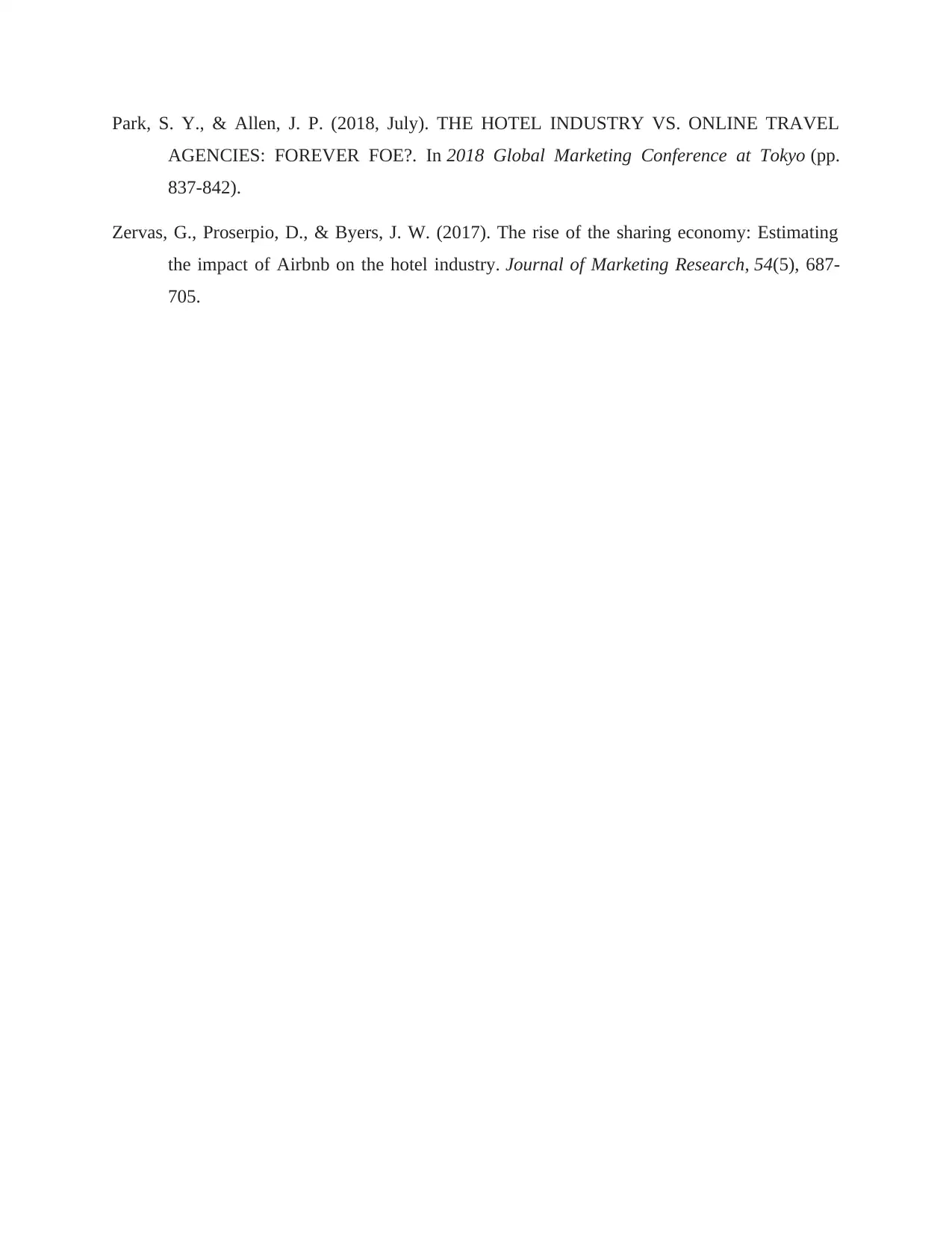
Park, S. Y., & Allen, J. P. (2018, July). THE HOTEL INDUSTRY VS. ONLINE TRAVEL
AGENCIES: FOREVER FOE?. In 2018 Global Marketing Conference at Tokyo (pp.
837-842).
Zervas, G., Proserpio, D., & Byers, J. W. (2017). The rise of the sharing economy: Estimating
the impact of Airbnb on the hotel industry. Journal of Marketing Research, 54(5), 687-
705.
AGENCIES: FOREVER FOE?. In 2018 Global Marketing Conference at Tokyo (pp.
837-842).
Zervas, G., Proserpio, D., & Byers, J. W. (2017). The rise of the sharing economy: Estimating
the impact of Airbnb on the hotel industry. Journal of Marketing Research, 54(5), 687-
705.
1 out of 7
Related Documents
Your All-in-One AI-Powered Toolkit for Academic Success.
+13062052269
info@desklib.com
Available 24*7 on WhatsApp / Email
![[object Object]](/_next/static/media/star-bottom.7253800d.svg)
Unlock your academic potential
Copyright © 2020–2026 A2Z Services. All Rights Reserved. Developed and managed by ZUCOL.




